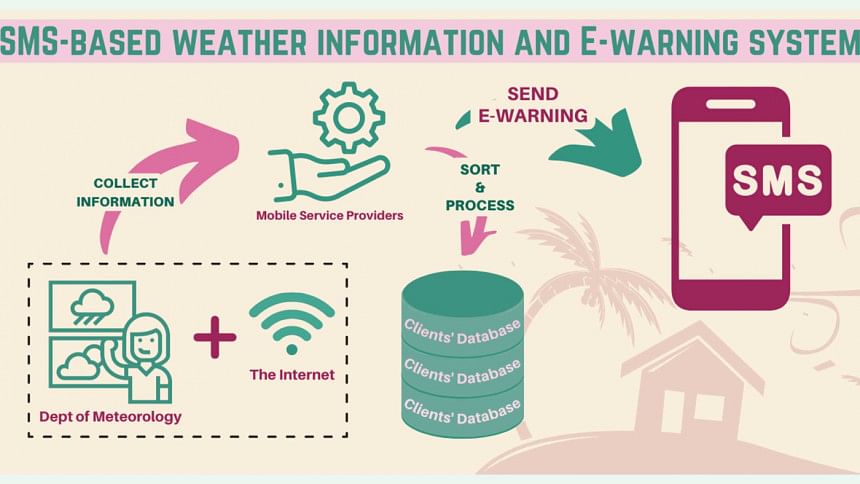One SMS can save thousands of farmers

On February 7 this year, an article by Mostafa Shabuj in The Daily Star Bangla titled "Why can't the government send timely weather information to farmers?" made me pause. The article mentioned an incident of heavy rainfall earlier this year that swamped vast areas of Joypurhat, Bogura and Dinajpur, damaging standing potato crops. It is assumed that had the farmers received prior information of the rainfall, they could have saved about 25 percent of their hard-earned produce. Such episodes are quite common, and the Bangladesh Bureau of Statistics (BBS) suggests that calamities of various degrees cause about Tk 30,000 crore worth of damage to properties across the country each year, of which 40 percent is standing crops, poultry and fisheries. Such losses can be minimised by providing the farmers with timely weather information. It is vital for our agriculture, a sector that feeds the whole country and provides more than one-third of our total employment.
Bangladesh's weather prediction mechanism is modelled after US technology, which is capable of predicting weather events 16 days in advance. Mostafa Shabuj's article raises an important question: Why should farmers accept such losses in the day and age of technological excellence? One of the main objectives of a disaster management system is to warn the masses about an upcoming calamity. Traditionally, radio and television channels have served that purpose, but with the advent of smartphones, the use of such old technologies has declined. Long- and short-term weather information are now available on different websites, but many farmers at grassroots level don't have smartphones or access to the internet. In order to overcome this bottleneck, the short-message service (SMS) on mobile phones can be utilised, since it does not depend on smart devices or the internet, and thus can reach any citizen in the country if they use a mobile phone.
There are two ways of transmitting SMS: a) the "Push type," where messages are sent to the subscribers without being asked (Govt Info is one such service that disseminates important information to the general public); and b) the "Pull type," where mobile phone users subscribe to an information relaying service (Bangladesh Railway has such a system that sends SMS with information about the location and arrival time of a train on request." Mobile phone subscribers receive four to five push SMSs daily on average from their service providers, most of which are informational or promotional. No weather information or warning as such is currently being transmitted via SMS.
The e-warning system is a communication strategy that gives people an early warning on all hazards and natural disasters to pursue effective response actions to tackle disasters before impact, thus dramatically reducing their effects on lives, properties and, in the case of farmers, crops and farm products. In order to be effective in Bangladesh, a) The system must be free, without requiring any registration or subscription; b) Users should not need a smart device or the internet—ordinary mobile phones should be enough; and c) Information must be delivered without request. An SMS-based weather information system can meet all these requirements.
Now, who can provide this service? The Indian government launched an SMS-based cyclone warning in as early as 2014. Our government can launch a similar system, but I suggest that mobile phone service providers deliver such a facility as part of their social responsibility. These providers are best placed to develop such a system since they have information on the locations of their subscribers and can track them in real time. This data is at the heart of the whole system. In a nutshell, the application will collect short- and long-term weather information from the Met Office or acquire them from different weather forecast websites. That data would then be sorted and processed according to locations (e.g. upazila-based) and an SMS would be pushed with warning and weather data as per the location of a subscriber. The system can be powered by artificial intelligence (AI) and fully automated, reducing the cost of operation to a minimum.
There can be arguments against such a system, citing that not all farmers own even the simplest of mobile phones. But with the number of mobile phone subscriptions at over 170 million (2020), such an argument is extremely futile, if not outright wrong. SMS has been widely adopted in Bangladesh, so an SMS-based e-warning system can be one of the best suited solutions. Culturally, rural Bangladesh is still a close-knit society. If a single mobile phone owner in the whole village receives an SMS warning on an upcoming storm, that information would surely spread within minutes.
Saifur Rahman is a senior IT specialist working in the Australian Public Service.

 For all latest news, follow The Daily Star's Google News channel.
For all latest news, follow The Daily Star's Google News channel. 



Comments